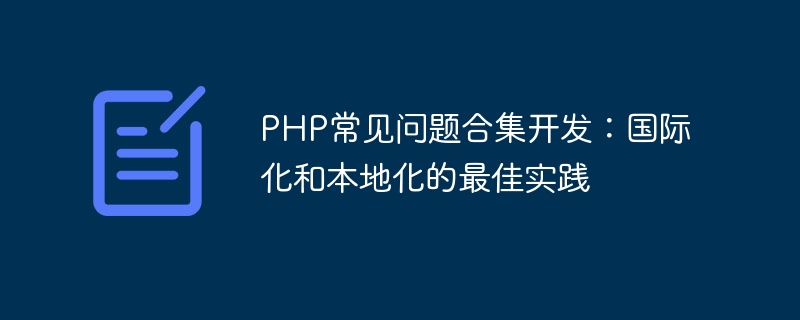Home >Backend Development >PHP Tutorial >PHP FAQ Collection Development: Best Practices for Internationalization and Localization
PHP FAQ Collection Development: Best Practices for Internationalization and Localization
- WBOYWBOYWBOYWBOYWBOYWBOYWBOYWBOYWBOYWBOYWBOYWBOYWBOriginal
- 2023-09-11 10:55:531511browse

PHP Frequently Asked Questions Collection Development: Best Practices for Internationalization and Localization
In today’s era of globalization, software development is also facing more challenges. One of the important challenges is how to achieve internationalization and localization. In PHP development, how to effectively handle multi-language and regional differences has become a key issue. This article will introduce some best practices for internationalization and localization in PHP development.
- Using language files
In PHP development, using language files is a common practice. A language file is a file containing strings for various languages, each language has its own file. By using language files, we can switch between different languages by introducing different files. In the language file, we can define some common phrases, messages, labels, etc. The advantage of using language files is that all text content can be managed in one place, which improves the maintainability of the code.
- Using internationalization functions
In PHP, there are some built-in functions that can help us achieve internationalization. For example, the gettext() function can return different translation results based on the current locale. Using the gettext() function, we can use the original language string as a key in the code to get the corresponding translation results. In this way, whether it is English, Chinese or other languages, the correct translation results can be returned according to the current locale.
- Dynamicly generate URL and date format
When performing internationalization and localization, there are some special situations that need to be considered. For example, URL and date format. The format of URL and date may differ in different countries and regions. Therefore, when designing URL and date formats, we should use dynamic generation to dynamically adjust the corresponding formats according to the user's language and region.
- Dealing with character encoding and time zone
In internationalization and localization development, character encoding and time zone are also important issues. Different countries and regions use different character encodings and time zones, which if not handled correctly can result in incorrect text and times being displayed. In PHP development, you can use the mb_internal_encoding() function to set the character encoding and the date_default_timezone_set() function to set the time zone.
- Provide language switching function
In an application that supports multiple languages, it is necessary to provide language switching function. Users can choose the language to use based on their needs. In PHP development, technologies such as SESSION or COOKIE can be used to save the user's language selection.
- Use translation tools
During the development process, if a large amount of translation work is required, you can consider using some automatic translation tools. These translation tools can automatically translate text according to some rules, greatly reducing the workload of manual translation. Of course, automatic translation tools cannot completely replace manual translation, so some manual proofreading is also required.
- Testing internationalization and localization
When developing internationalization and localization, we need to conduct sufficient testing to ensure that the code can correctly handle different languages and area. During testing, various edge cases should be considered, such as long strings, special characters, etc. At the same time, you should also pay attention to details such as cultural habits and idioms of a specific language.
Summary
Internationalization and localization are an important topic in PHP development and a common challenge faced by the modern software development field. This article introduces some best practices for internationalization and localization in PHP development, including using language files, internationalization functions, dynamically generating URLs and date formats, handling character encodings and time zones, providing language switching capabilities, using translation tools, and testing Internationalization and localization, etc. I hope readers can understand and apply these best practices through this article and improve their PHP development skills.
The above is the detailed content of PHP FAQ Collection Development: Best Practices for Internationalization and Localization. For more information, please follow other related articles on the PHP Chinese website!

